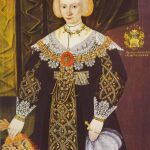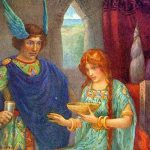
This is a story from the time of Saint Olaf or Olaf Saga Helga, (ie, Holy), or not so in the case of Olaf II. It took place in the year, 1026ce, in northern Norway at a settlement called Jamptaland, a sparsely settled area, that both kings of Norway and Sweden claimed taxes, a border area along the spine of rugged mountains and hostile weather.
The saga tells a story of an ancestor of Snorri Sturleson, 1220ce., the author of the ‘Heimskringla, the History of the Kings of Norway’, and this ancestor is Thorrodd Snorrason.
Now I will let the Saga tell of how this Icelander, Thorrodd Snorrason, made his journey through this wild and hostile area of Jamptaland and the first time in written sources that we see what is meant by the word, “Troll”.
On the orders of King Olaf Thorrodd Snorrasson had remained in Norway and had not received permission from the king to return to his native Iceland. Thorrodd being ill-pleased with not being allowed to travel wherever he chose and wanted to a master of his own fate volunteered to be an emissary to travel to Jamptaland on the orders of Olaf to collect taxes from the people of that land. However, Thrand the White and eleven others has been sent on the same mission to collect taxes and never returned. Thorrodd thought it better to be free and travel so he set off with eleven others to tell of what the King required, that a tax was to be levied.
They arrived east and met a man named Thorar he was the Law Speaker there and was a man of great distinction. They were well received there, and after having stayed there a short time they revealed there mission to Thorar. He repliedthat for an answer to it, other men and chieftains of the district were as responsible as he, and promised he would summon an assembly. Thorar laid the matter before the people, and they all agreed on not wanting to pay the King of Norway any tax. As to his emissaries, some wanted to hang them and make sacrifices. It was decided to detain them until the bailiffs from the King of Sweden arrived, the emissaries were well treated and lodged, and told to wait until the tax was collected, not knowing that the people of the district were to decide what to do with them and the emissaries were lodged two at a time, Thorrodd and a companion stayed at Thorar’s place.
At this time a great Yuletide entertainment was happening with joint drinking. There were many farmers in that settlement and they all drank together at Yuletide. There was another settlement not far away where lived a relation of Thorar, a powerful and wealthy man, who had a grown son. These relatives were to celebrate Yule at each other’s place in turn, first at Thorar’s. The two knsmen drank to one another, and Thorodd, to the farmer’s son. They held a drinking match, and in the evening a contest arose between the Norwegians and the Swedes. As the drinking progressed it became clear to Thorrodd things that he did not suspected and chose to leave the settlement, so Thorrodd and his companion took their clothes and left.
When it was discovered that they had fled, bloodhounds and men pursued Thorrodd and were found hiding in the forest. They were then thrown into to a pit and ill-treated. Being it was the middle of Yule Thorar left to see other kinsmen and left to guard Thorrodd was Thralls that began to get drunk and in the dark one of Thorrodd managed to get out of the pit by standing on his companions shoulders. Thorrodd tried as he could to lift up his companion only to find he could not, so he used a pulley and brought his friend out to the pit. They made there escape and by placing reindeer hooves on backward on their feet walked into the forest. Bloodhounds and men tried to track them but the reindeer scent and the backward marking hoofs fooled the men and dogs.
Thorrodd and his companion traveled through the deserted forest for a long while and then came upon a small farm. They went in and found a man and woman siting by the fire. The man gave his name as Thorir and said the woman sitting by him was his wife. He told him he had to flee the village due to a killing. Thorrodd and his companion were well entertained and afterwards they were given bedding and a place to sleep on the dias. When the fire in the fireplace was about to die down a man came in from another house, he had never seen so large a man. That man wore a scarlet cloak with a gold lace border and a most stately appearance
Thorrodd heard the man reproach the woman and said we hardly have enough to eat why are you doing this, and she said don’t be angry brother, this rarely happens before, rather you give them some help, because you are better able to do than we. Thorrodd heard the large man was named Arnjot Gellini and gathered that the woman of the house was his sister. Thorrodd had heard that Arnjot was a wicked highway man and evil doer.
They slept for a while and then Arnjot came to get them up and make ready for the journey. They were given breakfast and skis and departed, Arnjot on his broad and long skis and after some time it became hard for Thorrodd and his companion to keep up with Arnjot, so he told told Thorrodd stand on his skis behind him an to grab his belt and the companion to hang on to Thorrodd and Arnjot ran fast as if unencumbered.
After a third of the night had passed the three men came to a shelter and kindled fire and began to eat, but while the ate Arnjot told them to take care and throw away all bits and pieces of food, whether crumbs or bones. When they had finished eating they hid there leavings a prepared to go to sleep.
In on end of the house was a loft above the crossbeams. Arnjot and the two other climbed up into the loft and Arnjot slept on the outside toward the ladder and with his halberd and sword.
Shortly afterwards a group of twelve men came in, they were merchants traveling to Jamptaland with there wares. They were noisy and cheerful with merriment. They had kindled a big fire and ate their dinner and prepared to sleep and had left the remains of their dinner where they slept. After a short time a big Troll Woman came to the house and when she entered in she swiftly swept everything together, bones and everything she thought edible and devoured it. Then she grabbed the man nearest to her and ripped him to pieces, and threw him on the fire. Then other awoke as if from a bad dream, and jumped up, but she killed them one after the other, so only one survived, he ran under the loft and asked for help. Then Arnjot grabbed him by the shoulders and pulled him up. Arnjot grabbed his halberd and ran it through her between the shoulder blades so the point came out at her breast. She reared up quickly and shrieked fiendishly, and rushed out of doors. Arnjot had to let go his spear and she took it with her. Arnjot cleared away the corpses and set the door and door frame back in the house, for she had broken both when she ran out.
They slept the remainder of the night, and when it dawned they arose and ate their breakfast and when they had eaten, Arnjot said, “now we shall have to part, you must follow the tracks that the merchants made when they came here yesterday, but I shall be looking for my halberd As a reward for what I did for you I will take some of the things these men had brought along. You Thorrodd shall deliver my greeting to King Olaf.
Thorrodd journeyed on and met King Olaf and the King grand Thorrodd permission to leave Norway and return home to Iceland.
Thorgrun Odden
Gothi,
Asatru Folk Assembly



